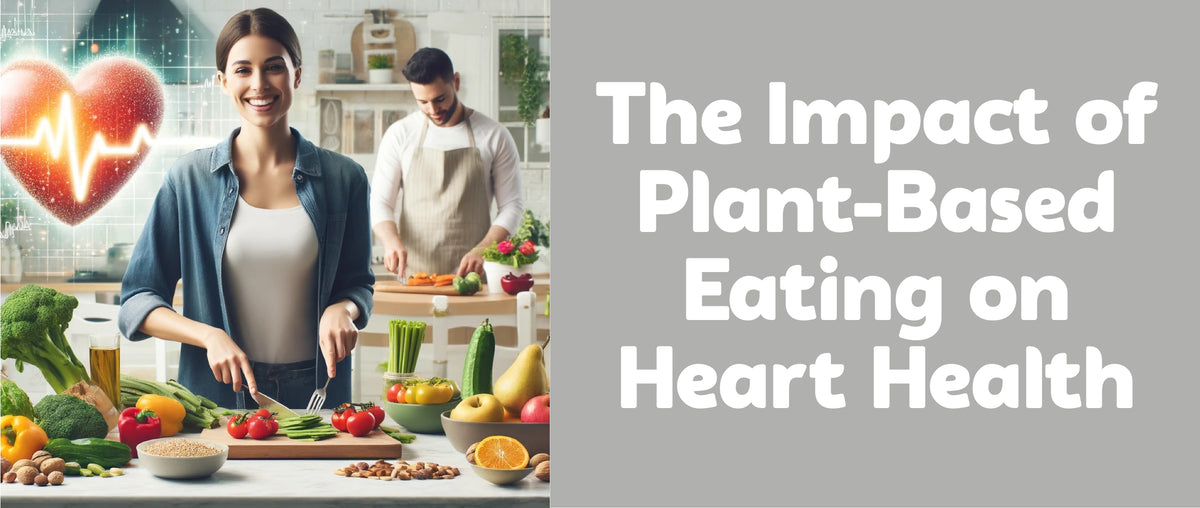The Science Behind Plant Based Diets and Heart Health
Cardiovascular health is a critical aspect of overall well-being, with heart disease being one of the leading causes of death globally. The role of diet in managing and preventing heart-related issues is significant. Over recent years, plant based diets have gained immense popularity for their potential to improve heart health, among other benefits. This article delves into the science behind Plant based diets and cardiovascular health, exploring the benefits, mechanisms, and practical tips for adopting such a diet.
Key Takeaways
- Plant based diets are linked to a reduced risk of heart disease.
- These diets help lower cholesterol, blood pressure, and inflammation.
- Plant based diets are rich in nutrients beneficial for heart health.
- Adopting a Plant based diet can aid in weight management and diabetes prevention.
- Practical tips and meal ideas can help ease the transition to a Plant based diet.
What Are Plant based Diets?
Plant based diets focus on consuming foods derived from plants, including vegetables, fruits, nuts, seeds, oils, whole grains, legumes, and beans. These diets exclude or minimize animal products and processed foods, emphasizing whole and natural food sources.
Types of Plant based Diets
1. Vegan: Excludes all animal products, including dairy and eggs.
2. Vegetarian: Excludes meat but may include dairy and eggs.
3. Pescatarian: Includes fish but excludes other meats.
4. Flexitarian: Primarily plant-based but occasionally includes meat or fish.

How Plant based Diets Impact Cardiovascular Health
Reduction in Cholesterol Levels
Plant based diets are renowned for their ability to lower cholesterol levels, primarily due to the high fiber content found in foods like Oat Milk, legumes, and whole grains. Fiber binds with cholesterol in the digestive system, helping to remove it from the body. This process significantly reduces LDL (bad) cholesterol levels, a major risk factor for heart disease.
Lower Blood Pressure
Consuming Plant based foods rich in potassium, such as bananas and leafy greens, helps manage blood pressure. Potassium helps balance sodium levels in the body, reducing the strain on blood vessels. Dietary nitrate from vegetables like beets also contributes to this effect, enhancing blood flow and lowering blood pressure.
Decreased Inflammation
Plant based diets are abundant in antioxidants and phytochemicals, which reduce inflammation, a key factor in cardiovascular disease. Foods such as berries, nuts, and seeds are rich in these compounds, providing anti-inflammatory benefits that protect the heart.
Nutritional Components of Plant based Diets
High Fiber Content
High-fiber foods, such as beans, lentils, fruits, and vegetables, are staples in Plant based diets. Fiber aids in reducing cholesterol and maintaining a healthy digestive system. It also helps regulate blood sugar levels, contributing to overall cardiovascular health.
Healthy Fats
Healthy fats, including omega-3 and omega-6 fatty acids found in Cashew Butter and Unsalted Butter, are essential for heart health. These fats help reduce inflammation and improve cholesterol levels. Avocados, nuts, seeds, and olive oil are excellent sources of healthy fats in a Plant based diet.
Antioxidants and Phytochemicals
Antioxidants and phytochemicals, present in a variety of fruits and vegetables, protect against oxidative stress and inflammation. Foods like berries, nuts, and green leafy vegetables are excellent sources of these beneficial compounds. These nutrients help neutralize free radicals, reducing the risk of chronic diseases, including heart disease.
Clinical Evidence and Studies
Major Studies Supporting Plant based Diets
Numerous studies highlight the benefits of Plant based diets for heart health. For instance, research published in the Journal of the American Heart Association found that Plant based diets can reduce the risk of heart disease by up to 32%. Another study published in the Journal of the American College of Cardiology reported that individuals following a Plant based diet had significantly lower levels of LDL cholesterol and improved heart health markers.
Detailed Analysis of Statistical Data
Studies consistently show lower rates of heart disease among those who follow Plant based diets compared to those who consume meat-heavy diets. For example, a meta-analysis of prospective cohort studies published in the Journal of Nutrition indicated that vegetarians and vegans had a 25% lower risk of developing heart disease compared to meat-eaters.
Case Studies and Clinical Trials
Case studies and clinical trials provide real-world evidence of how Plant based diets can improve heart health. One notable trial demonstrated significant reductions in cholesterol and blood pressure among participants who adopted a vegan diet. The Ornish Lifestyle Medicine Program, which includes a Plant based diet, has shown remarkable results in reversing heart disease.
Mechanisms Behind the Benefits
Cholesterol and Blood Pressure Reduction
Plant based diets reduce LDL cholesterol levels due to the absence of animal fats and the presence of soluble fiber. The potassium and magnesium in Plant based foods help relax blood vessels, lowering blood pressure. These minerals are abundant in foods like bananas, sweet potatoes, and spinach.
Role of Specific Nutrients
Nutrients like omega-3 fatty acids, found in flaxseeds and walnuts, and antioxidants, found in berries and leafy greens, play a crucial role in heart health. Omega-3 fatty acids reduce inflammation and prevent blood clots, while antioxidants protect against oxidative stress.
Impact on Weight Management and Diabetes Prevention
Plant based diets are typically lower in calories and higher in fiber, aiding in weight management. They also help regulate blood sugar levels, reducing the risk of diabetes, a significant risk factor for heart disease. Foods like legumes, whole grains, and vegetables provide sustained energy and prevent blood sugar spikes.
Also Read
Comparing Plant based Diets to Other Diets
Standard Western Diets
The standard Western diet is high in processed foods, sugars, and unhealthy fats, leading to increased heart disease risk. In contrast, Plant based diets emphasize whole, unprocessed foods, providing essential nutrients that support heart health. The Western diet often lacks the fiber, vitamins, and minerals necessary for cardiovascular health.
Mediterranean Diets
While the Mediterranean diet includes Plant based foods, it also incorporates fish and moderate dairy consumption. Both diets have cardiovascular benefits, but Plant based diets may offer additional protection due to the exclusion of animal products. The Mediterranean diet’s inclusion of olive oil, nuts, and seeds aligns with the healthy fat sources in a Plant based diet.
Practical Tips for Adopting a Plant based Diet
How to Start a Plant based Diet
- Begin by incorporating more fruits, vegetables, and whole grains into your meals.
- Gradually reduce your intake of animal products.
- Experiment with Plant based alternatives such as Vegan Cheese and vegan butter .
Meal Planning and Recipes
Breakfast:
- Try a High Protein Vegan Breakfast with Oat Milk, nuts, and seeds.
- Avocado toast on whole grain bread topped with cherry tomatoes and Garlic Butter.
Lunch:
- Enjoy a salad with a variety of vegetables, beans, and vegan cheese.
- Whole grain wrap with hummus, roasted vegetables, and leafy greens.
Dinner:
- Opt for a hearty vegetable stew or stir-fry with tofu and Plant based foods.
- Stir-fried tofu with mixed vegetables and brown rice.
- Lentil soup with a side of whole grain bread spread with vegan butter.
Snacks:
- Carrot sticks with cashew butter.
- Homemade trail mix with nuts, seeds, and dried fruit.
Addressing Common Concerns and Myths
- Myth: Plant based diets lack protein.
Fact: High protein vegan food like beans, lentils, and tofu provide ample protein. - Myth: Plant based diets are expensive.
Fact: Many Plant based staples, such as grains and beans, are cost-effective. - Myth: Plant based diets are boring and lack variety.
Fact: There are countless Plant based recipes and cuisines to explore.
Potential Challenges and Considerations
- Nutrient Deficiencies: Ensure adequate intake of nutrients like vitamin B12, iron, and calcium. Consider supplements if necessary.
- Social and Lifestyle Challenges: Eating out and social gatherings may pose challenges. Plan ahead and look for restaurants with Plant based options.
Tips for Overcoming These Challenges
- Prepare and bring your own dishes to social events.
- Educate friends and family about the benefits of your diet to gain support.
- Find Plant based versions of your favorite meals to ease the transition.
Conclusion
Plant based diets offer numerous benefits for cardiovascular health, including lower cholesterol, reduced blood pressure, and decreased inflammation. Adopting a Plant based diet can be a practical and effective way to improve heart health and overall well-being. With the right knowledge and resources, transitioning to a Plant based diet can be both enjoyable and rewarding.
Do you enjoy vegan food? We have a list of vegan restaurants in India to help you find delicious options in your area!










